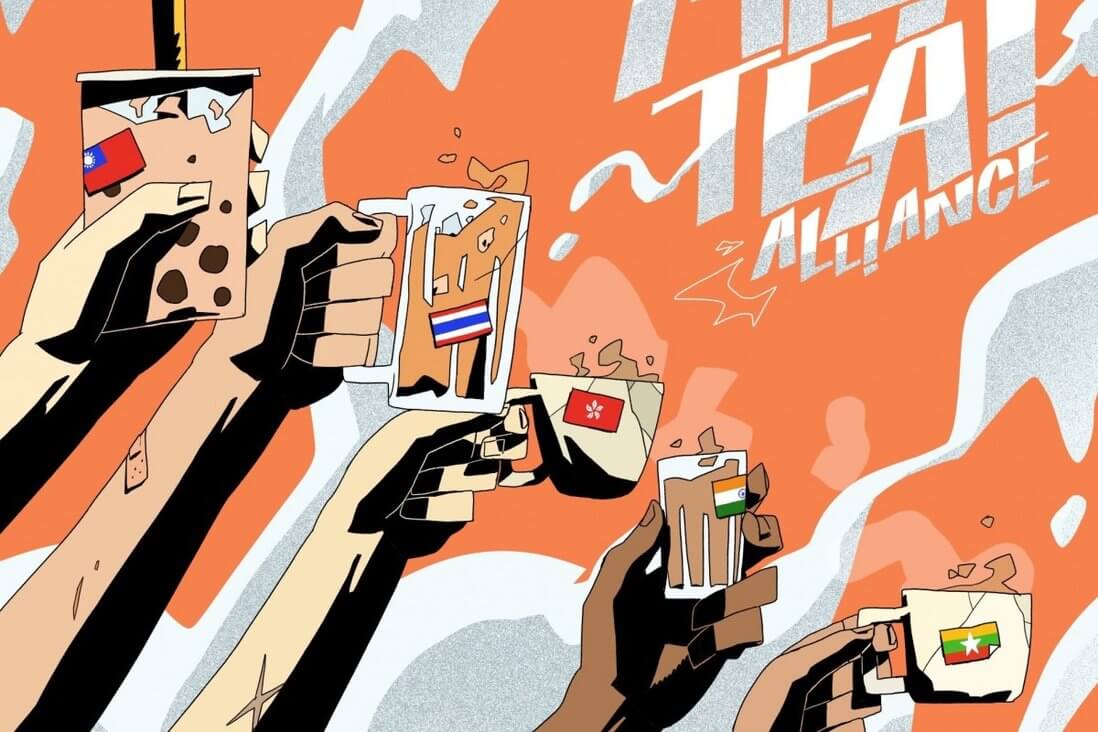‘Boston Tea Party’ Online
May 18, 2021 | Expert Insights

The military junta in Myanmar grossly misread public sentiments this time around when they carried out their bloodless coup a month ago. As pro-democracy protesters openly defy martial law and rally against the house arrest of former State Counsellor Aung San Suu Kyi, the Tatmadaw has been steadily escalating its use of lethal force against them.
Undaunted by the crackdown and shootings, thousands of demonstrators, especially the youth, continue to pour out onto the streets. By uniting under the banner of the ‘Milk Tea Alliance’ (MTA), many of them have formed transnational solidarities with activists in other Asian countries, including Thailand, Taiwan, and Hong Kong.
As this cross-border, online-based group makes its presence felt in Naypyidaw, the strategies adopted by it are worth studying. After all, popular movements that ultimately bring down mighty empires are often birthed in the crucible of such seemingly insignificant political and social occurrences.
A RECIPE FOR RESISTANCE
Representing a loose coalition of young, tech-savvy democracy advocates, the MTA was formed in the wake of an online meme battle waged in Thailand and China. The re-tweeting of a photo montage by a Thai teen idol, which inadvertently identified Hong Kong as a separate country, was the original trigger for MTA. Although the celebrity in question later apologised, pro-Beijing trolls on the internet were not appeased.
Sino nationalists continued to launch vicious attacks on social media platforms, which soon deteriorated into a full-blown virtual war, drawing in participants from Hong Kong and Taiwan. It eventually metamorphosed into a digital campaign by South-East Asian activists that targeted China for its perceived ‘bullying’ policies in the region.
Meanwhile, a popular meme that depicted citizens of Thailand, Taiwan, and Hong Kong holding up their respective milk-tea beverages, started to gain traction as a beacon of resistance. This was intended to be a deliberate snub to the Chinese who prefer tea without dairy products. Over time, however, the MTA transcended its anti-China roots and became a larger existential struggle against authoritarianism worldwide.
Much like the regional variations in milk-tea drinks, members of this alliance came to be defined by their own disparate agendas. For instance, MTA members in Thailand emerged as an integral part of student protests that sought to curtail the monarchy’s prerogatives and enact democratic reforms. Meanwhile, in Hong Kong, they strove to restore the city’s political freedoms, which had come under attack from Beijing. Similarly, activists in Taipei pushed back against the Dragon’s attempts to reunify their island with the Chinese mainland.
While the specific goals of these protests were indeed varied, they seemed to share a certain cultural affinity and ideological value that made the MTA a political force to reckon with.
FRIENDS SANS BORDERS
If recent events are any indication, young people from Myanmar are the latest to join this Milk Tea club. Ever since the coup d’état, images of the Burmese milk tea joining the MTA have been flooding the internet. Pro-democracy protesters have been actively borrowing strategies from their fellow activists in South-East Asia.They have also galvanised support across national borders and deployed social media networks to devise, adapt, and share protest tactics.
For example, it is reported that Myanmar’s youth are using Hong Kong-style flash mobs as well as Thai-inspired three-finger salutes in their demonstrations. Hundreds of people have also taken out rallies in Bangkok and Hong Kong, following a call for help from pro-democracy campaigners in Naypyidaw. Against this backdrop, it would be naïve to underestimate the political heft of the MTA and its ‘friends in the ASEAN’.
READING THE TEA LEAVES
Of course, it is not uncommon for popular movements to derive inspiration from each other. In this case, however, intelligence-sharing between activists in Hong Kong, Taiwan, Thailand, and Myanmar has proceeded at an unprecedented scale. Through digital platforms like Facebook, Twitter, WhatsApp and Telegram, the MTA has identified young demographic aspirations, channelled it towards socio-political causes and facilitated real-time communication in what is essentially an online coalition.
If such enthusiasm endures, protests like these can attract global attention and even accelerate the imposition of foreign sanctions against authoritarian regimes. To be able to shape such strategic policies, however, the MTA still has a long way to go.
At present, many dismiss it as an ad hoc grouping that has no real negotiating power or organisational structure. In Thailand, it has also failed to win over the older generation, many of whom are avowed royalists and conservative in their thinking.
Moreover, it must be noted that autocratic governments have access to the same digital tools that are currently touted to be the MTA’s assets. Together with their deep pockets and pliable security forces, they can effectively deploy them to establish surveillance networks. Just as democratic movements look to each other for inspiration, authoritarian regimes can also copy each other’s playbooks.
Therefore, it is vital for the MTA to take these factors into account, as it looks to build upon transnational collaboration and usher in democratic reforms. Otherwise, it may inherit the dismal fate of the ‘Arab Spring’ movement.
Assessment
- The MTA can emerge as a significant political force across Asia, if it enhances its leadership, coordination and organisational strategies. At the same time, it will be critical to retain the flexibility of its online platforms, which allow protesters to mobilise spontaneously and adopt their own tactics.
- For China and the other regional powers, it is important to read the subtext of movements like the MTA. Along with a lack of political autonomy, young people are expressing their discontentment about risinginequalities and economic hardships, which have only been exacerbated by the COVID-19 pandemic.
- For Beijing, the space ceded to MTA is also emblematic of a failure to nurture soft power in South-East Asian countries.








Comments